1. Overview
Chilperic I, who reigned as King of Neustria (Soissons) from 561 until his death in 584, was a significant, albeit controversial, figure of the Merovingian dynasty. Born around 539, he was one of the sons of Frankish King Clotaire I and Queen Aregund. His reign was marked by relentless territorial disputes and power struggles with his brothers, particularly Sigebert I of Austrasia, which escalated into prolonged and bloody conflicts. Beyond his military endeavors, Chilperic I was noted for his intellectual curiosity and cultural pursuits, including poetry, music, and attempts at linguistic and legal reforms. Critically, his reign also saw policies that raised concerns regarding social justice and human rights, such as the forced conversion of Jews and controversial theological stances. His life concluded abruptly with his assassination in 584, leaving a complex legacy that has been viewed both critically by contemporaries like Gregory of Tours and, in retrospect, recognized for its contributions to the cultural and legal landscape of the Frankish realm.
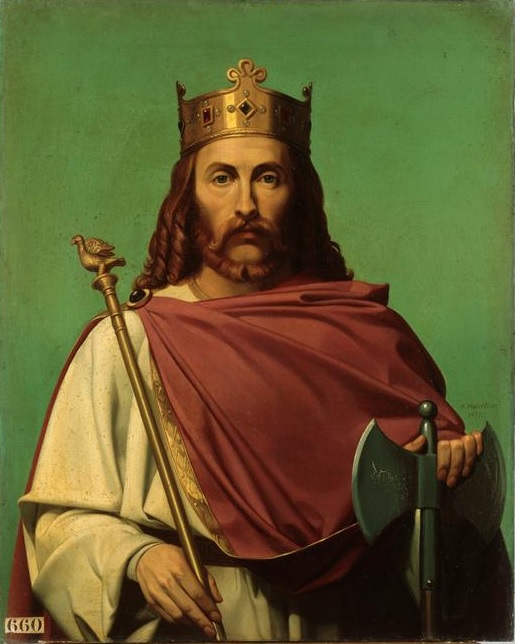
2. Early Life and Background
2.1. Birth and Parents
Chilperic I was born around 539, the son of Clotaire I, who was King of the Franks, and his wife, Queen Aregund. He was the youngest son among Clotaire's children from various marriages.
2.2. Succession and Territorial Division
Upon the death of his father, Clotaire I, in 561, Chilperic immediately sought to claim the entirety of the Frankish kingdom. He swiftly moved to Braine, near Compiègne, where his father's court was located, and seized the royal treasure amassed in the town of Berny-Rivière. He distributed portions of this wealth to the leaders of his retainers residing nearby, securing their loyalty. Chilperic then occupied Paris. However, his elder brothers, Charibert I, Guntram, and Sigebert I, compelled him to agree to a division of the kingdom. Through a process described as a "lottery" or drawing of lots, the realm was partitioned. Chilperic's share primarily consisted of the territory of Soissons, which formed the core of what would become Neustria, along with the cities of Amiens, Arras, Cambrai, Thérouanne, Tournai, and Boulogne.
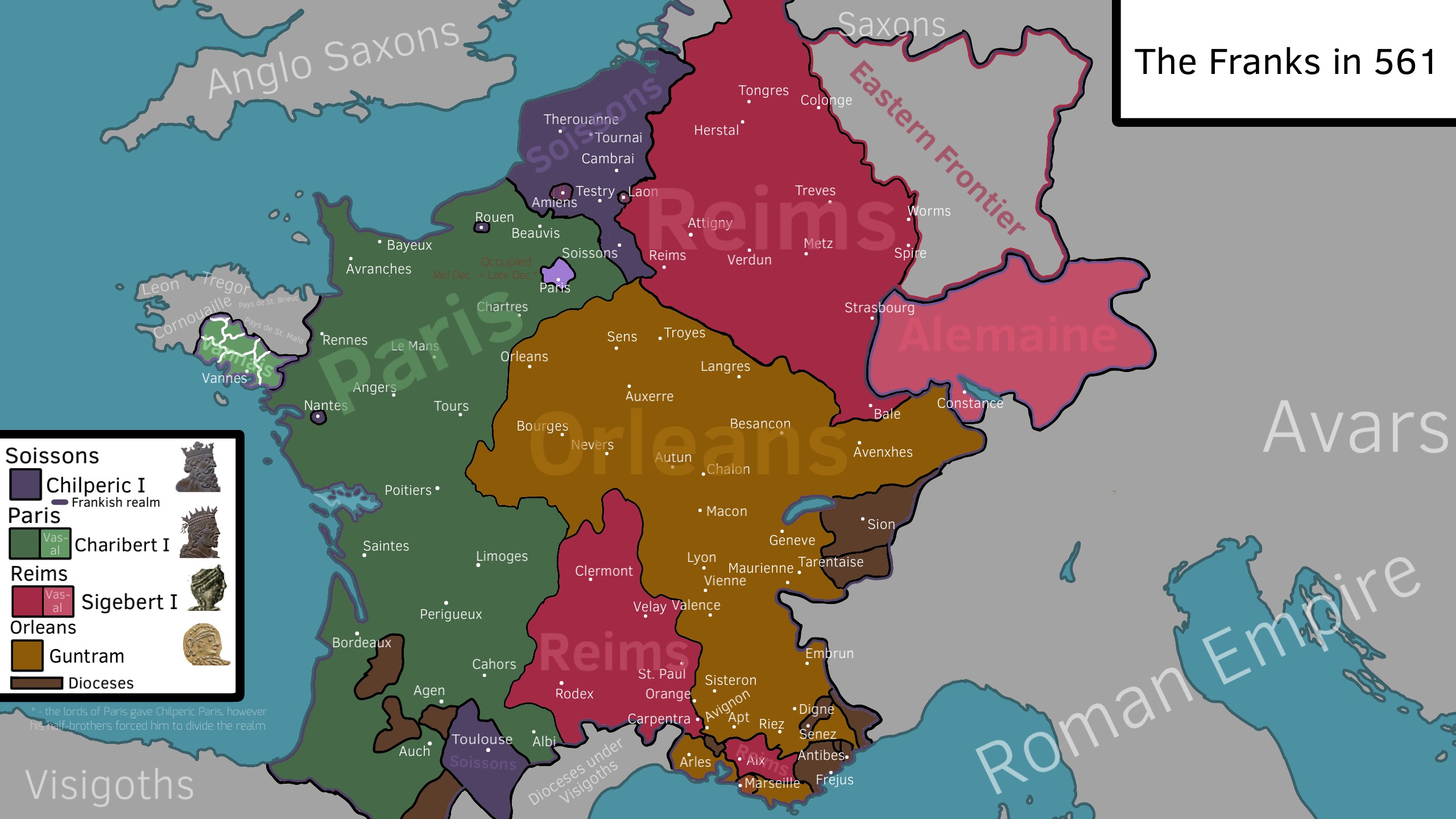
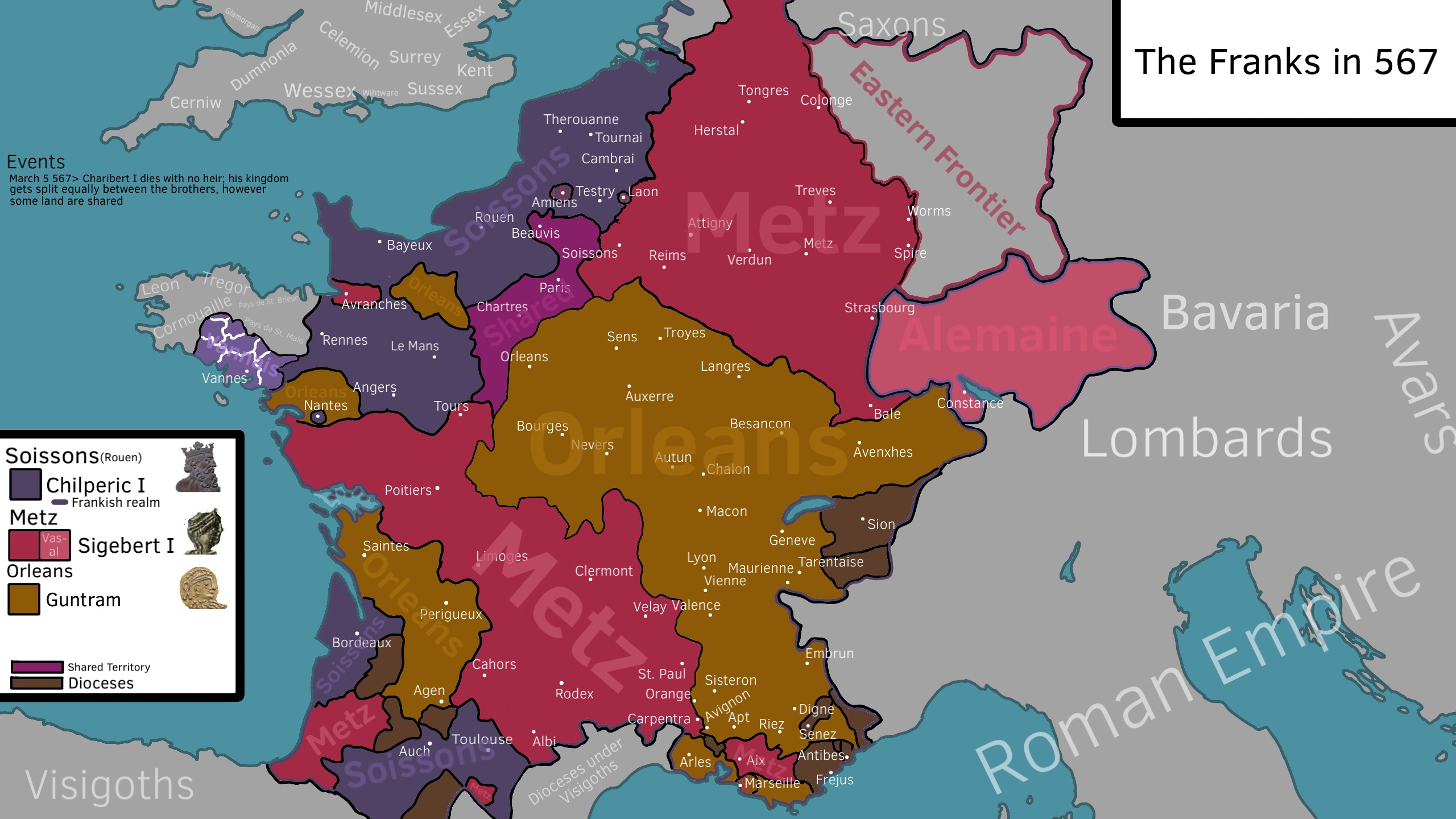
In 567, Charibert I, the eldest brother, died. His kingdom was subsequently divided among the remaining three brothers. Chilperic's territories were significantly augmented, as he inherited a third of Paris and the surrounding area, along with cities such as Limoges, Cahors, Bordeaux, Béarn, Bigorre, and the Pyrenees region. The brothers also agreed to share control over Paris itself.
3. Reign and Political Activities
Chilperic's reign was characterized by continuous conflict and strategic maneuvering, primarily against his brothers and neighboring powers.
3.1. Conflicts with Brothers
Soon after his accession to the throne, Chilperic found himself embroiled in a state of perpetual antipathy and warfare with his brother Sigebert I. The conflict began when Sigebert campaigned against the Pannonian Avars, possibly in Thuringia, pushing them back towards the Elbe River. Seizing the opportunity while Sigebert was distant from his lands, Chilperic launched an attack on Reims and captured it. However, Sigebert quickly returned, recaptured Reims, and marched on Soissons, where he defeated Chilperic's forces, seized the city, and imprisoned Chilperic's eldest son, Theudebert.
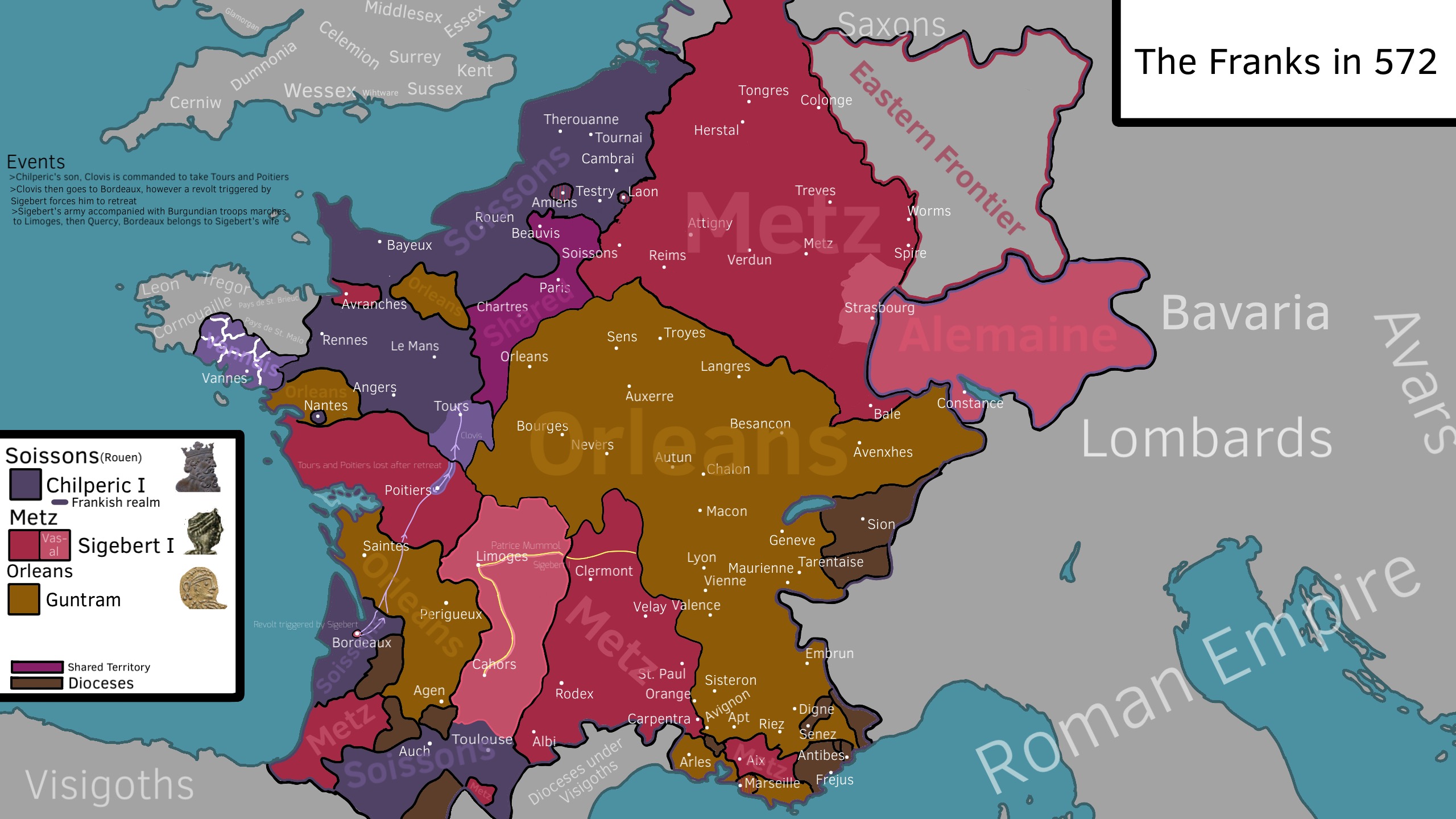
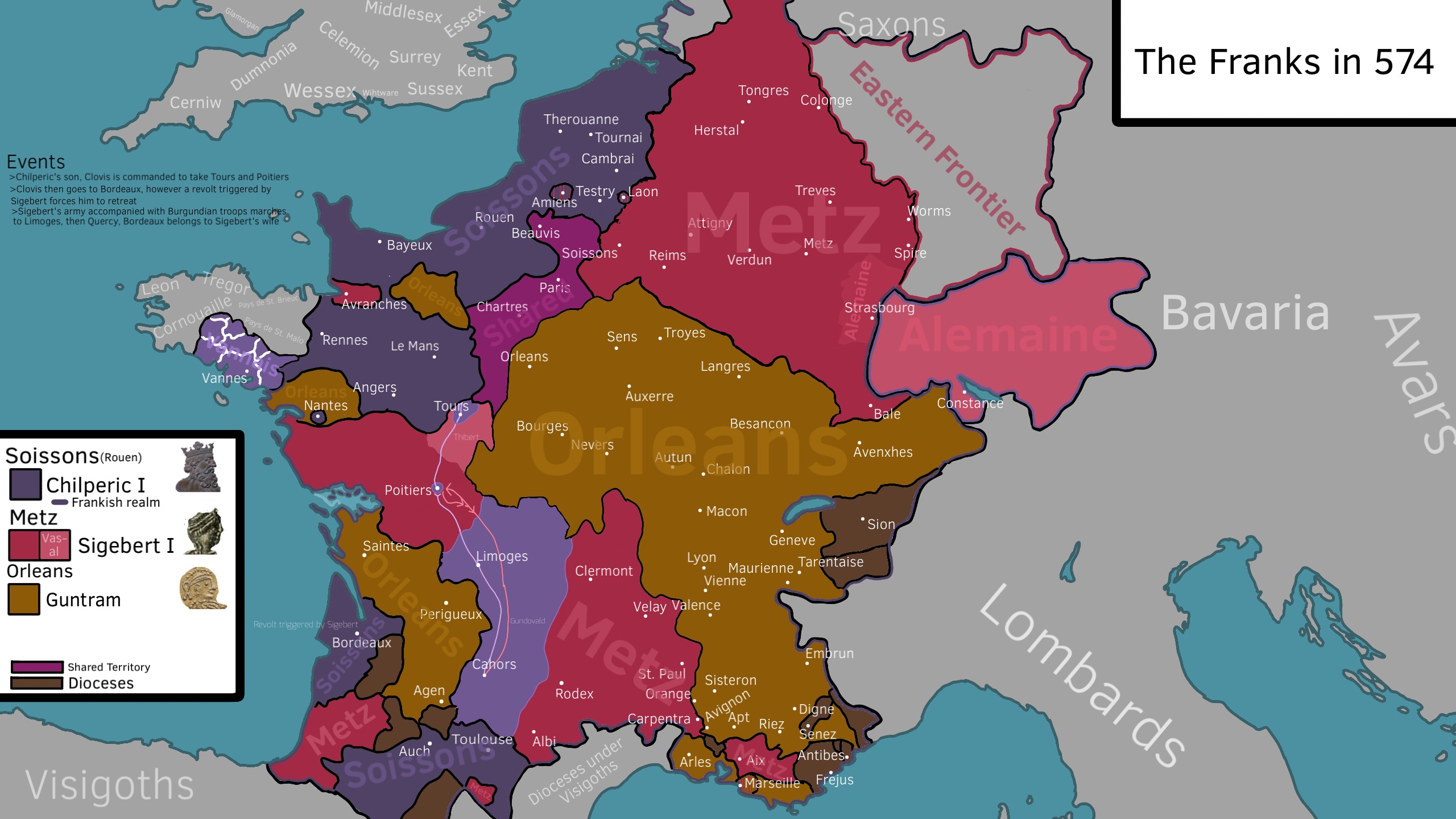
The war intensified in 567 following the death of Charibert. Chilperic immediately invaded Sigebert's newly acquired territories, but Sigebert once again defeated him. In 573, Chilperic formed an alliance with his brother Guntram against Sigebert. However, Guntram, fearing the large army Sigebert had assembled across the Rhine, changed allegiance. Sigebert bypassed Chilperic's strong defenses by crossing through Burgundy, leading to another defeat for Chilperic.
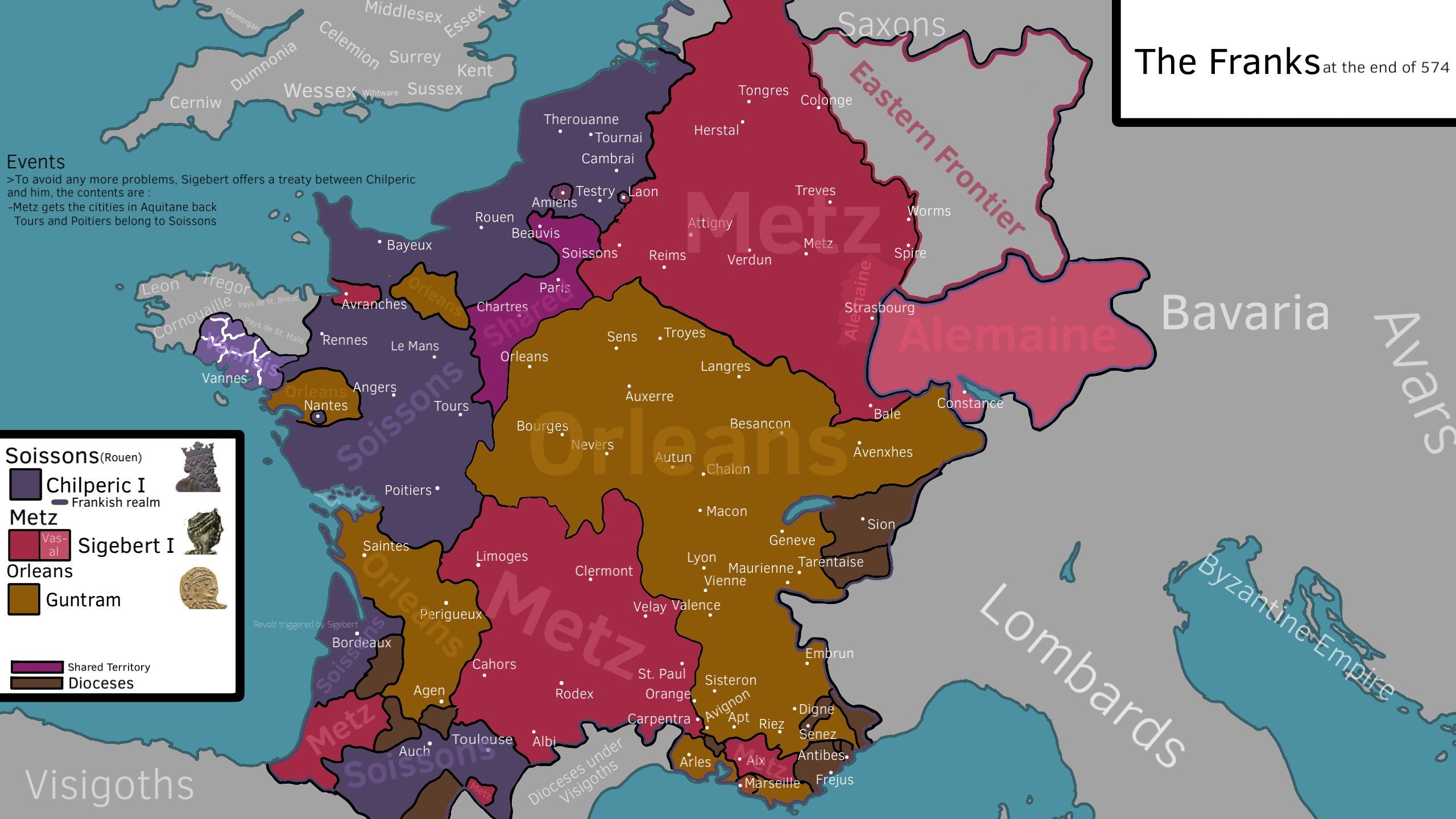
The long and bloody wars between Chilperic and Sigebert, often punctuated by temporary truces, frequently centered around control of Tours and Poitiers. The conflict reached a critical point in early December 575 when Sigebert was assassinated by two clerks acting on behalf of Chilperic's wife, Fredegund. This occurred just as Sigebert had Chilperic at his mercy, besieging him in Tournai and Rouen, and after Chilperic's son Thibert was killed near Paris when Sigebert illegally entered and seized the city.
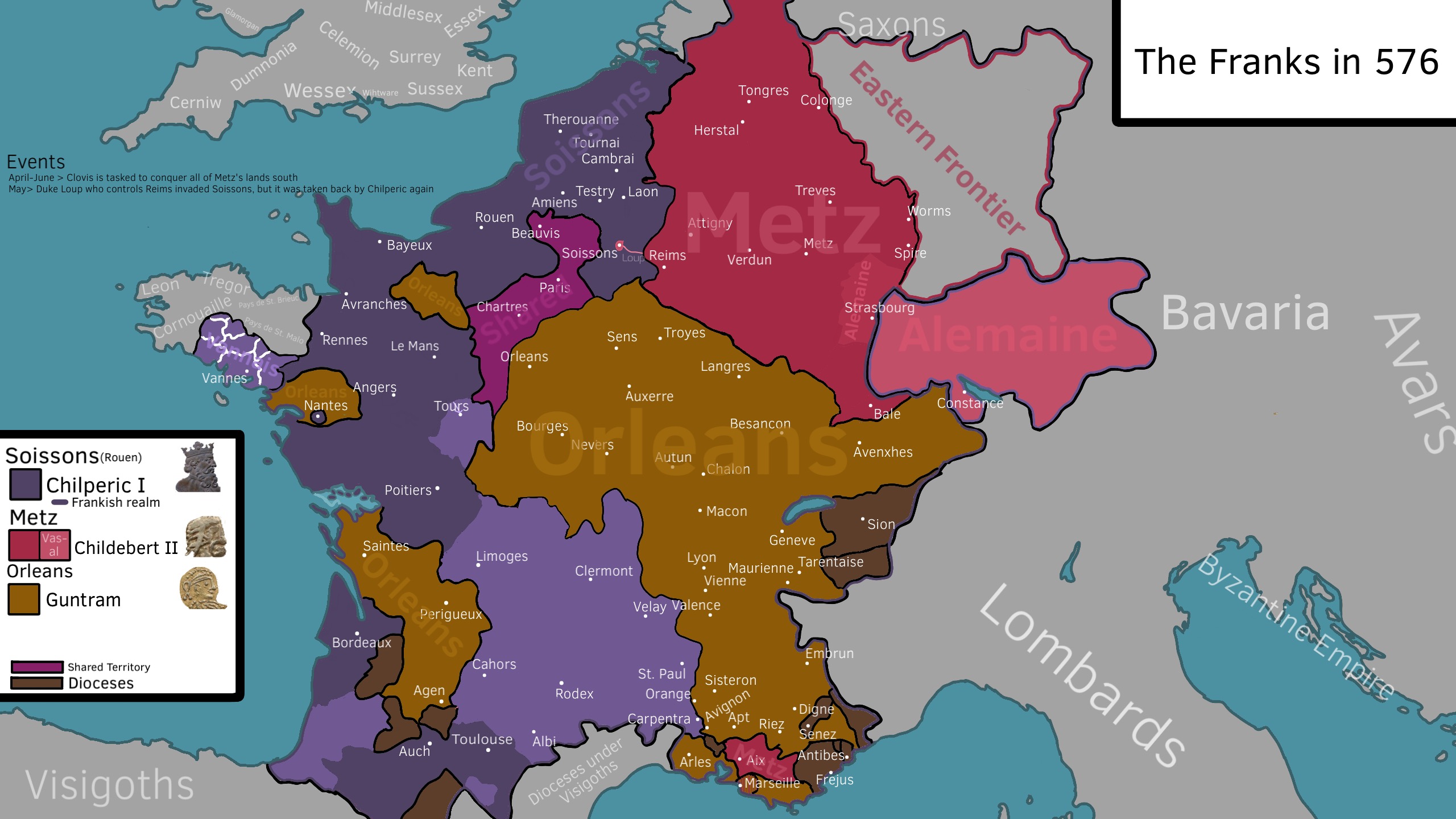
Following Sigebert's death, Chilperic engaged in war with Guntram, who had become the protector of Sigebert's widow and son. Chilperic managed to secure the loyalty of nobles who had previously sided with Sigebert, seizing Tours and Poitiers from Austrasia, as well as several places in Aquitaine, including Saintes and territory in Auvergne, where a major battle was fought against Mummol, serving under Guntram. During the minority of Childebert II, Sigebert's son, Chilperic actively fostered discord within the eastern kingdom of Austrasia.
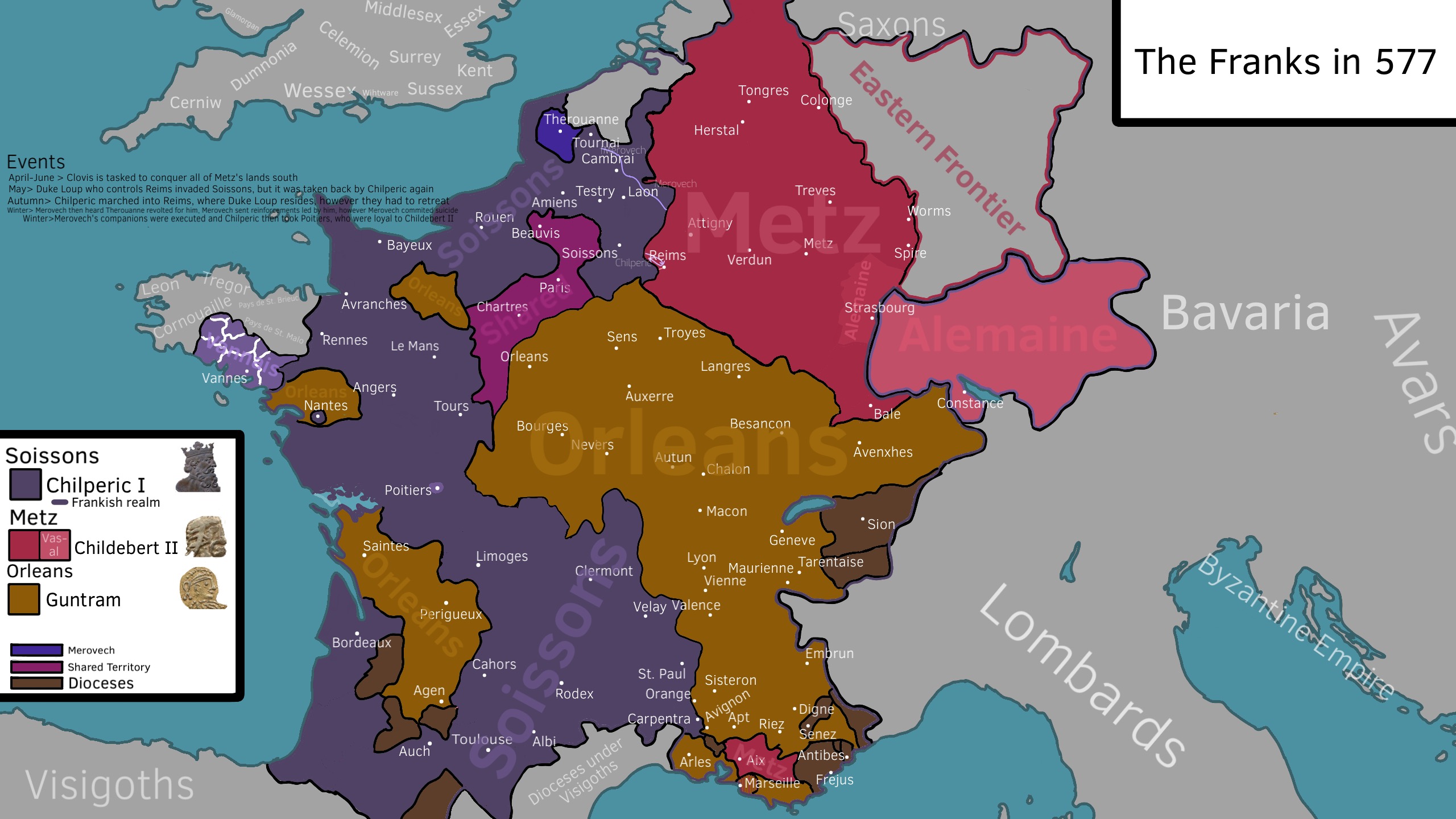
3.2. Breton Campaign
In 578, Chilperic dispatched an army to confront the Breton ruler Waroch II of the Bro-Wened region, along the Vilaine River. The Frankish forces comprised contingents from Poitou, Touraine, Anjou, Maine, and Bayeux. Notably, the Baiocassenses, men from Bayeux who were of Saxon origin, were particularly routed by the Bretons. The armies engaged in battle for three days before Waroch submitted to Chilperic. He paid homage for Vannes, sent his son as a hostage, and agreed to pay an annual tribute. Although Waroch later broke his oath, Chilperic's authority over the Bretons remained relatively secure, a fact celebrated in a poem by Venantius Fortunatus.
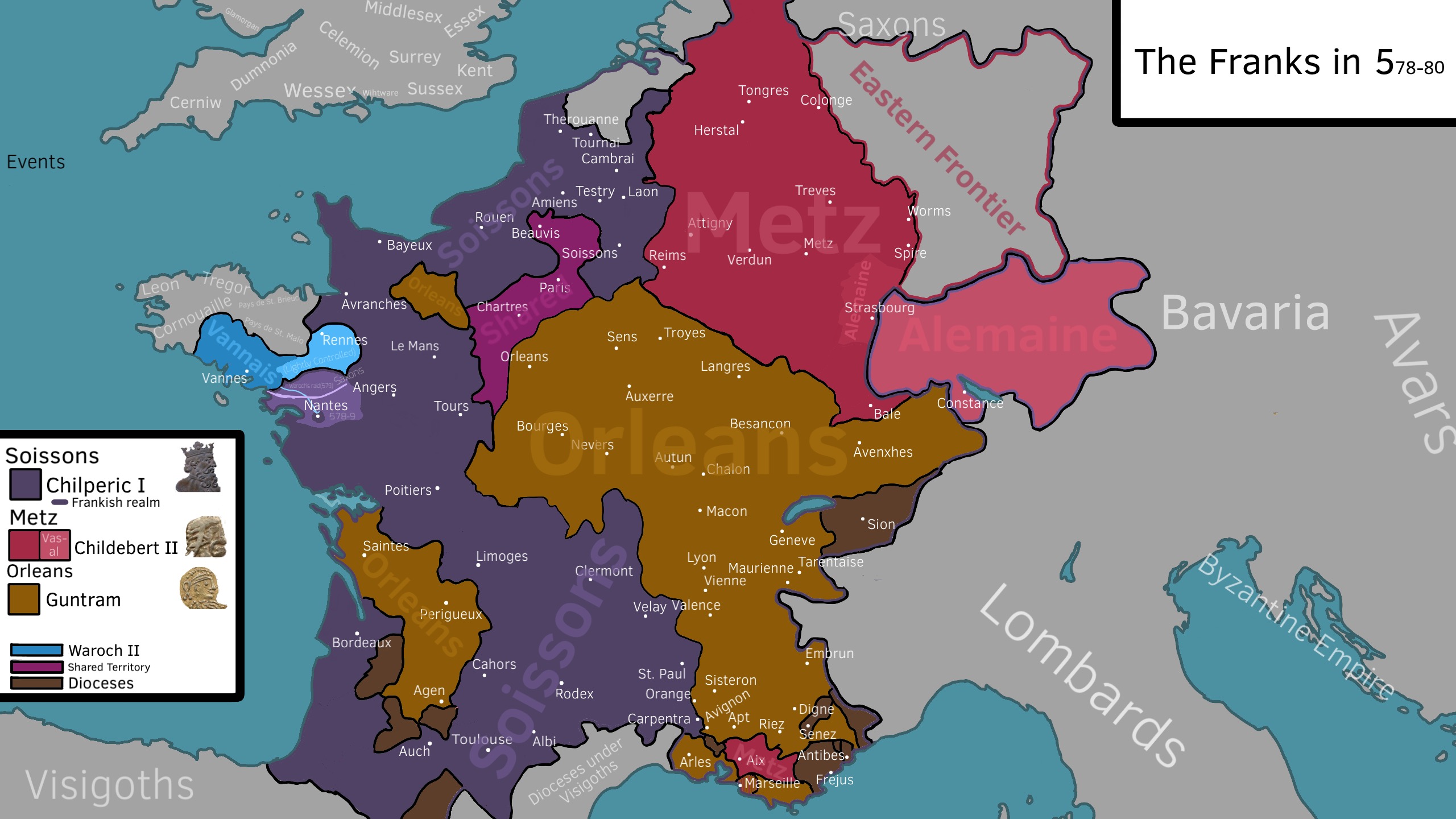
4. Marriage and Family
Chilperic I's personal life was complex and fraught with political implications, marked by several marriages and the tragic fates of many of his children.
4.1. First Marriage and Children
Chilperic I's first marriage was to Audovera. They had five children:
- Theudebert (killed in battle in 573).
- Merovech (killed by a servant at his own request in 577), who married his aunt by marriage, Brunhilda, the widow of his father's brother Sigebert, and subsequently became an enemy of his father.
- Clovis (assassinated by Fredegund in 580).
- Basina (died after 590), who became a nun and later led a revolt in the abbey of Poitiers.
- Childesinda (died young from dysentery).
4.2. Second Marriage and Galswintha's Death
Following the repudiation of Audovera and a period during which he kept a serving-woman named Fredegund as his concubine, Chilperic sought a more prestigious alliance. He dismissed Fredegund and married Galswintha, the sister of Brunhilda (Sigebert's wife) and daughter of Athanagild, the Visigothic sovereign in Spain. However, Chilperic soon grew tired of Galswintha. One morning, Galswintha was found strangled in her bed. Sources suggest this act was carried out by Chilperic's confidants under his instruction. This murder had profound political repercussions, igniting a long and bloody series of wars between Chilperic and Sigebert, Galswintha's brother-in-law, who sought "blood revenge" in accordance with Frankish custom. Their brother Guntram attempted to mediate, and a great assembly was held. According to Salic law, the territories of Limoges, Cahors, Bordeaux, Béarn, and Bigorre were awarded to Brunhilda as compensation. Chilperic, however, remained dissatisfied with this decision, leading to further military actions, including his invasion of Austrasian territories like Tours and Poitiers in 573.
4.3. Relationship with Fredegund and Children
Just a few days after Galswintha's death, Chilperic married Fredegund, his former concubine, around 568. Fredegund would become a dominant and ruthless figure in his court, deeply influencing his reign and contributing to the ongoing conflicts with the other Frankish kingdoms. Their marriage produced six legitimate children:
- Rigunth (born around 569, died after 589), who was betrothed to Reccared I but never married him.
- Chlodebert (born around 570 or 572, died 580), who died young.
- Samson (born around 573, died late 577), who also died young.
- Dagobert (born around 579 or 580, died 580), who died young.
- Theuderic (born around 582, died 584), who died young.
- Chlothar II (born before September 584, died 18 October 629), who survived his siblings and father to become Chilperic's successor in Neustria, and later, the sole King of the Franks.
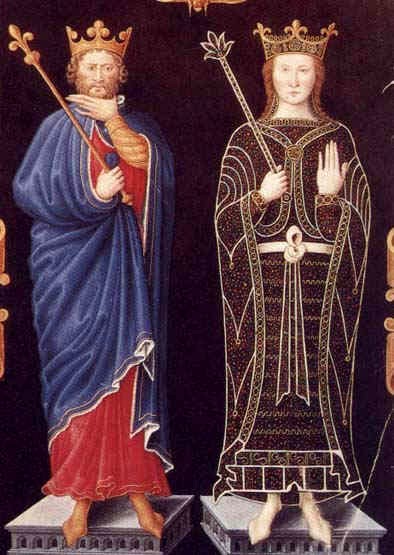
5. Cultural and Intellectual Activities
Chilperic I was not merely a warrior king; he also showed a notable interest in cultural and intellectual pursuits, distinguishing him from many of his contemporaries.
5.1. Literature, Music, and Language Reform
Chilperic possessed a talent for music and composed verse, reportedly modeling his poetry on that of Coelius Sedulius. He was known to engage in literary discussions and even forced figures like Gregory of Tours to listen to his poetic compositions. Beyond artistic endeavors, Chilperic also attempted to reform the Frankish alphabet, indicating an interest in standardizing and improving written communication within his realm.
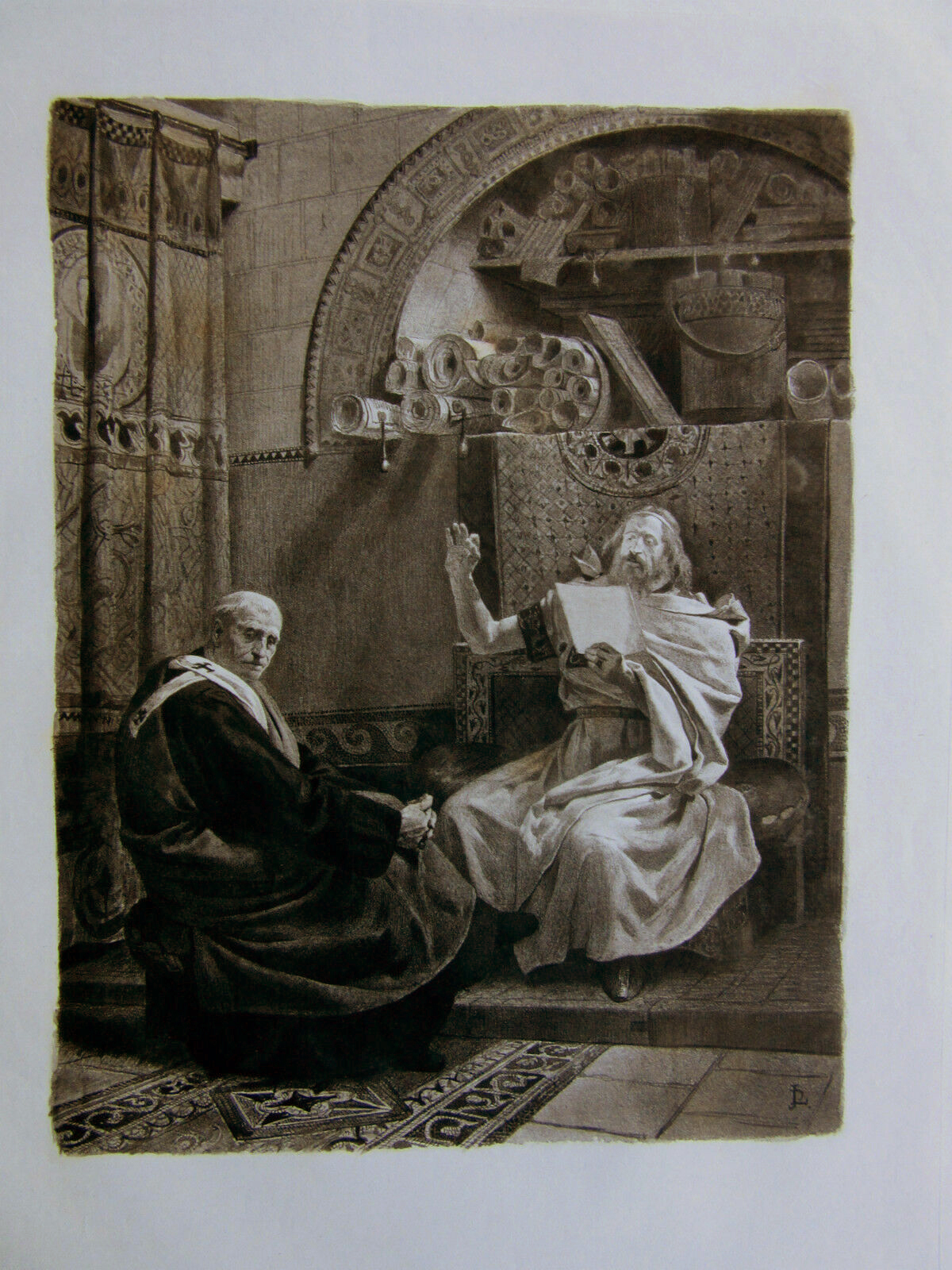
5.2. Attempts at Legal Reform
One of Chilperic's significant, and often overlooked, contributions was his effort to mitigate some of the harsher aspects of Salic law, particularly its adverse effects on women. He worked to reduce the most detrimental impacts of these traditional laws, demonstrating a progressive stance for his time regarding social justice and the protection of vulnerable groups within his kingdom.
6. Religious Views and Controversies
Chilperic's reign was also marked by his engagement with religious matters, which often led to controversy and criticism from ecclesiastical authorities.
6.1. Trinity Doctrine Debate
Chilperic I displayed a keen interest in theological debates. He attempted to introduce new doctrines concerning the Trinity, which were considered heterodox by the established Church. His theological views and efforts to impose them met with strong opposition from religious authorities of the time, most notably from Gregory of Tours, who viewed these attempts as a dangerous deviation from orthodox Christian belief.
6.2. Treatment of Minorities
Chilperic's policies towards minority groups, particularly the Jewish population, drew significant criticism. He is recorded to have engaged in the forced conversion of Jews within his kingdom. This policy highlights a problematic aspect of his reign, raising concerns about religious freedom and minority human rights, as it involved coercion rather than voluntary conversion.
7. Death
7.1. Assassination
In September 584, Chilperic I's reign came to an abrupt and violent end. While returning from a hunting expedition at his royal villa in Chelles, he was stabbed to death by an unknown assailant. Some accounts suggest that a chamberlain named Eberulf was declared the perpetrator, with his lands subsequently confiscated. Chilperic was buried in the Saint Vincent Basilica in Paris, which was later incorporated into the Saint-Germain-des-Prés complex.
8. Assessment and Legacy
Chilperic I's reign evokes varied assessments, ranging from contemporary condemnation to more nuanced historical analysis.
8.1. Contemporary Assessment
Much of what is known about Chilperic I comes from The History of the Franks by Gregory of Tours, a contemporary bishop who held a deeply critical view of the king. Gregory famously detested Chilperic, going so far as to label him "the Nero and Herod of his time." Gregory's animosity stemmed from several actions by Chilperic, including his attempts to seize Tours from Austrasian control, his appropriation of ecclesiastical property, and his controversial appointment of counts of the palace, who were not clerics, as bishops. While Gregory's portrayal is highly influential, some modern scholars dispute the full extent of his personal dislike for Chilperic, suggesting a more complex relationship.

8.2. Historical Criticism
Historically, Chilperic I has been criticized for his tyrannical ruling style, his ruthless decisions, and his controversial policies. His involvement in the murder of his second wife, Galswintha, and the subsequent bloody wars with Sigebert I, are often cited as examples of his moral failings and destabilizing influence. His attempts to introduce new theological doctrines and his forced conversion of Jews further contribute to a critical view of his reign, highlighting a disregard for religious orthodoxy and individual rights.
8.3. Positive Contributions
Despite the criticisms, Chilperic I made notable positive contributions. He was a man of culture and an active patron of the arts, demonstrating talent as a musician and a poet. His efforts to reform the Frankish alphabet indicate a forward-thinking approach to governance and administration. Perhaps most significantly, his attempts to reduce the harsh effects of Salic law on women underscore a progressive stance on social justice, aiming to protect vulnerable groups within his society. These initiatives suggest a ruler who, despite his flaws, was not entirely consumed by warfare and power struggles but also sought to improve the legal and cultural foundations of his kingdom.
9. Impact on the Frankish Realm
Chilperic I's reign had a profound and lasting impact on the Frankish realm. His relentless pursuit of power and territory, particularly through his prolonged conflicts with his brothers, contributed significantly to the internal strife and fragmentation that characterized the Merovingian period. The assassination of Sigebert I, orchestrated by Fredegund, and Chilperic's subsequent attempts to exploit the minority of Childebert II, further destabilized the eastern kingdom of Austrasia. His actions exacerbated the rivalries between the different Frankish sub-kingdoms, setting a precedent for future dynastic struggles. However, his efforts in legal reform, particularly concerning women's rights under Salic law, and his cultural patronage, laid some groundwork for later legal and cultural developments in the Frankish kingdoms. The birth of his son, Chlothar II, who would eventually reunite the Frankish kingdoms, also ensured the continuation of the Merovingian line and shaped the future trajectory of early medieval Europe.
10. Etymology
The name 'Chilperic' is of Germanic origin. In Frankish, it meant "powerful supporter." This meaning is akin to the modern German word hilfreichhelpfulGerman or "auxiliary," derived from Hilfehelp, aidGerman and reichrich, powerfulGerman.
11. Cultural References
Chilperic I's life and reign have inspired later cultural works. An operetta titled Chilpéric was created by the French composer Hervé, first performed in 1864. This work reflects the enduring fascination with the dramatic and often turbulent lives of the Merovingian monarchs.